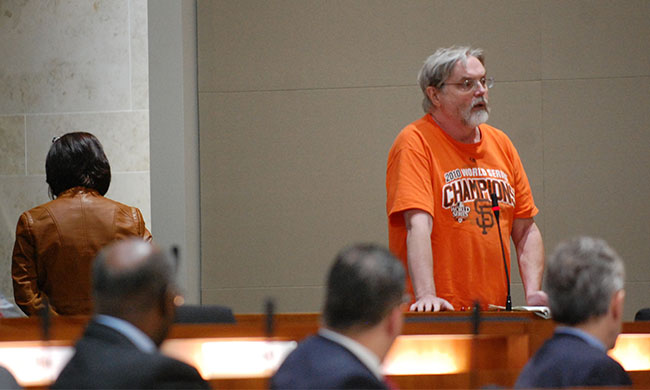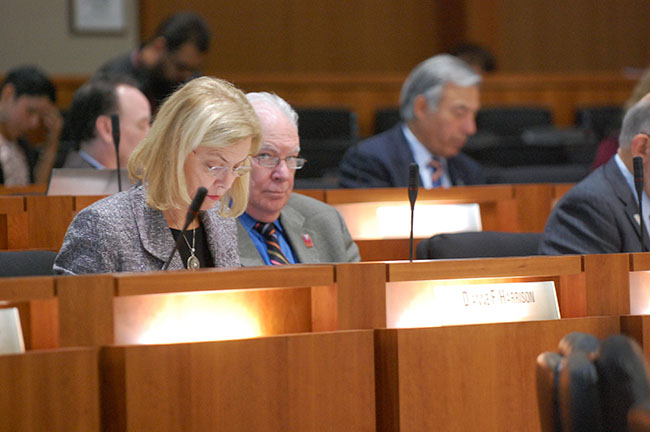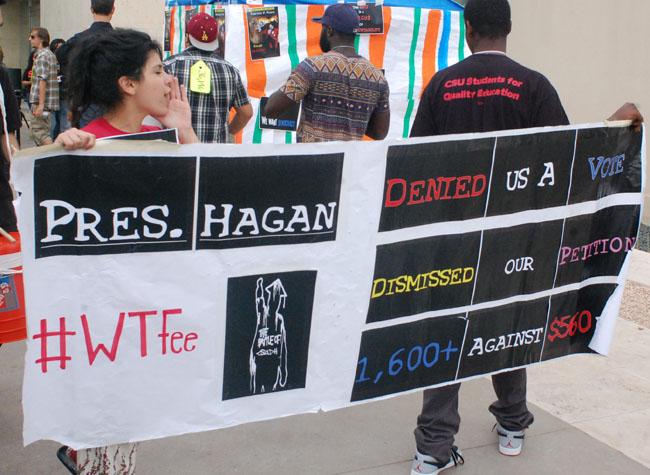
Chants from the Students for Quality Education (SQE) rang on the back walls of the conference room at the Cal State Office of the Chancellor for more than five hours on Thursday as officials discussed the school’s budgets and policies. The California State University (CSU) Board of Trustees, CSU campus presidents and Lt. Governor Gavin Newsom could only power through their discussion as the protest carried on outside.
The board held the meeting, which ran several hours late, to take action on the support and lottery revenue budget for the 2015-2016 year; both of which were approved. As well, they heard new information on and discussed campus title IX compliance, elimination efforts of sexual assault and student success fees – the latter being the reason for the SQE protest.
“We oppose the fees because we are already paying too much for our education,” 22-year old Cheyenne Aldridge, SQE organizer and Sonoma State undergrad said. “We are a public state institution so I don’t understand why we should have our fees increased. They have been increasing greatly over the past decade and we haven’t been getting the things that we need.”
For the past decade fees, which are a campus specific part of tuition, have increased as the state has slowly been unable to cover cost which it traditionally subsidized for students. The budget crisis of the past decade only made matter worse as campuses had to cut classes, reduce the number of full time faculty and here at CSUN implemented a unit cap which can make it difficult to graduate on time.
“At my school specifically they have made it so that it’s hard to graduate within the four year process,” Aldridge said as the crowd behind her chanted: “WTF –what the fee.” “They have restricted our classroom availability which end up making us stay longer and prices of the classes go up and it makes it impossible for us to graduate.”
The fees are designed to provide each campus with funding specific to their needs. The idea behind the fees being that not all campuses will need to charge the same fee so the students and officials there can decide how steep to make the fee so that they can supplement payment for clubs, organizations and student services.
The student success fees at Northridge help provide funding for organizations like the Associated Students (AS) and The Sundial but cost each student $212. On other campuses the fees range from $35 to $780.
CSU Chancellor Timothy White said that while the fees have been difficult to impose they have offered schools a way of supplementing funding where the state not been able to cover. He continued to say that the changes in our budgets have been the result of a slowing down of funding from the state and a simultaneous increase in student enrollment which has sparked more competition for admittance.
“I think we are trying to balance the fact and deliver the clear message that if demand exceeds capacity then we are going to down regulate access a little bit in order to provide the genuine high quality experience of excellence and learning environment for those that can get in,” White said.
White said that while the fees provide a benefit to students on campus by enhancing and strengthening student life and spirit they have so far lacked transparency.
“It’s another form of tuition that lacks transparency and there is need for greater student input,” White said. “Should be paid for by the state and hinders student progress towards degree.”
The board agreed that the fees do offer an added benefit to student life on campus but that students should be involved more in deciding the fees since they are specific to each campus.
“The problem I think comes down to who decides,” Douglas Fagin, CSU Board of Trustees member, said.” And would be to change those fees from a top-down direction to requiring a simple majority vote … so that is a huge, big difference. It ends the student fees as we know it has been and creates a student-driven creative process.”
Fagin said the results of the vote would specify how much the fees would be if his hypothetical method of implementing students success fees were adopted.
He noted that the advantage to involving students more directly in the approval of student success fees is that they would now be able to make a sound judgment between the price of the fees they are willing to pay and the services they are willing to fund.
Fagin then went on to explain how a vote like this would take place.
“So what I would propose is that any new fee would have to stay in effect for least six years,” Fagin said. He chose six years because graduation in six years (or less but greater than four) has become a sort of nation wide standard for graduation success.
“The understanding the would be that there would be a generally whole new crop of students after six years who would address that issue on their own,” Fagin said.

The board largely agreed with Fagin but during their discussion an issue arose which placed in view the fear that these fees might create a division amongst the CSU schools and disparity amongst its student population. The ways in which fee implementation would be imposed worried Newsom who said that there was no clear way, which had been proposed, as to how high and how much the fees could differentiate at different the fees could be at each campus.
“As much as I appreciate autonomy and local control and accountability, I’m very worried that we’ll see a system that will begin to fray between the haves and have nots,” Newsom said. “It’s not dissimilar to the one offered by former leadership of UC Berkeley and UC Los Angeles, talking about pulling away from the rest of the system because they can attract higher tuition and student bodies and the system becomes frayed and there is a disparity of the haves and the have nots.”
Newsom said that the goal of the CSU has been to provide higher-level education to the students across from varying socioeconomic backgrounds and who have demonstrated an ability for the rigors of it’s coursework. He said the hidden danger behind the fees, which could fray the student population at higher fee campuses, would be counter to the historic goal of the CSU system of providing affordable and quality education.
“I think we’re walking down the path and it’s as much a question as a statement,” said Newsom. “I didn’t hear any consideration of caps; I mean we said you can’t do it more than once a year, but can you double it? Trip triple? What stops a select cohort of students to burdening the rest of the system with success fee? Once you establish fixed costs that run in perpetuity, you are then also burdening the long-term budget.”
Although the discussion of the budget and fees went on for an extended period of time the board made time to recognize the efforts of by CSUN and San Francisco State to eliminate sexual assault and comply with Title IX.
Both issues have become White House goals following recent revelations that many universities have failed to properly handle sexual assaults and sex assault claims on campus.
CSUN President Dianne Harrison said that our campus and our sister schools were not satisfied with mere compliance of Title IX, but instead want to become leaders in the campaign to end sexual violence on campus. Harrison cited the schools’ various sexual violence prevention and awareness programs (“Project date”, “Shine a light”, “Strength United”) and its recent hiring of TITLE IX systemwide officer Pam Thompson as evidence of the CSU efforts.
“We want to ratchet up primary prevention efforts which involves initiatives and programs which strive to stop violence from ever occurring in the first place,” Leslie Wong, SF State president said. “The focus [is] not only on attitudinal shifts, but on behavioral change.”
S.F State’s initiative to address masculinity and stereotypes associated with it are one of the ways Wongs says they have created a behavioral change.
“Although most men are not perpetrators, most perpetrators are men,” Wong said. “To develop the program we engage male students in the examination of stereotypical masculinity to promote emotional intelligence and empower and encourage men’s role in actively preventing violence among themselves and against women.”
The CSU presidents will for now return to their campuses and work on this issues outlayed during the past two days. The board will reconvene in early January and will present new information on the effects of student success fees and the progress of the Title IX officer.











